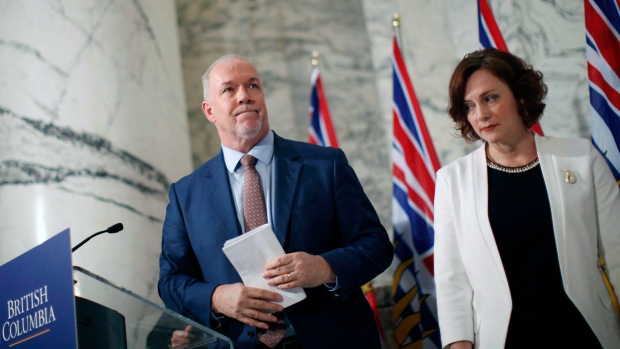VICTORIA -- Communities across British Columbia are speaking out against the province's proposed speculation tax on real estate, saying the levy could damage their economies.
The Regional District of Nanaimo joined West Kelowna on Wednesday in asking the NDP government to rethink the tax, introduced in last month's budget.
West Kelowna council voted unanimously to seek an exemption from the proposed tax covering the entire community of 35,000 people in the Okanagan.
The Nanaimo Regional District board, representing much of central Vancouver Island, also voted unanimously to "object to the speculation tax in any form, in any region or municipality in B.C.
Board members asked for a meeting with Finance Minister Carole James to discuss the tax and they invited the mayors of Nanaimo, Parksville, Qualicum Beach and Lantzville to attend.
In a statement Wednesday, board chairman Bill Veenhof said there are deep concerns about the potential impact of the tax on people who own vacation properties in the Nanaimo area.
"These people are not speculators," the statement says. "They are important members of our communities. Families who visit year after year, supporting local businesses, paying their fair share of property taxes, and investing in our tourism-based economy."
West Kelowna Mayor Doug Findlater said his community includes a large population of part-time residents and he fears there could be a real estate crisis if people decide to sell rather than pay the levy.
He said there are already signs developers are hitting pause on local projects.
"Suddenly, the development market is freezing up," Findlater said in an interview. "The banks are not loaning and some developers are being caught in this already. I'm aware of that. Other developers who haven't built are just putting it all on hold and just waiting for the air to clear."
James said she is reviewing the tax, which would cost some homeowners $5 for every $1,000 of their property's assessed value this year and increase to $20 for every $1,000 of assessed value in 2019.
"I want to stay focused on the reason we're doing this, which is for affordability," she said. "When you have in Kelowna a 0.2 per cent vacancy rate, that causes all kinds of problems."
The speculation tax would apply to properties owned by people who do not pay income tax in B.C. in a bid to improve housing affordability and moderate the real estate market. But many B.C. residents with vacation properties are saying government policy offering income tax credits to offset potential tax increases does not go far enough.






